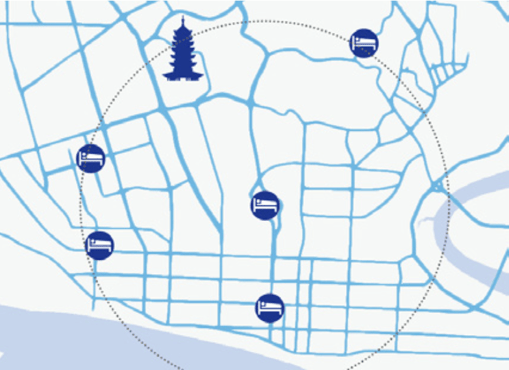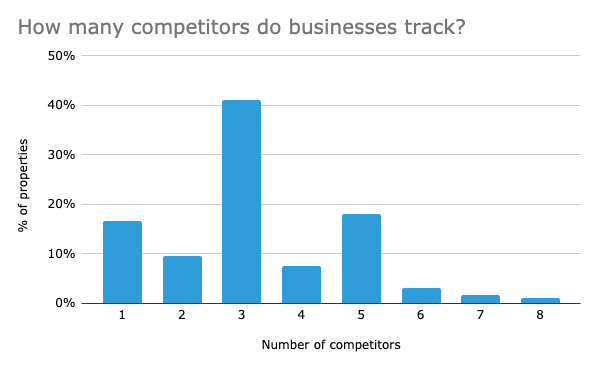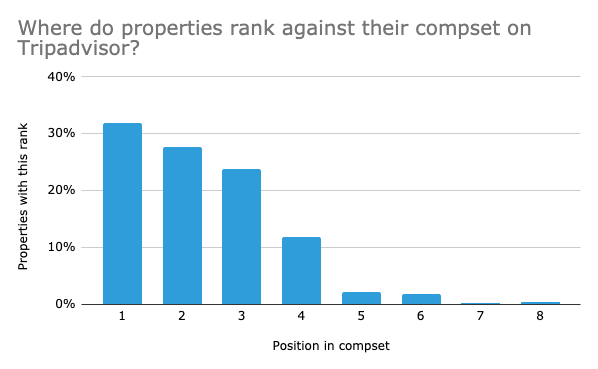Ensuring you’re keeping an eye on the competition is a crucial part of hotel management – knowing where you stand out and where you need to work harder can inform many aspects of your operations, human resources, and marketing strategies.
NB: This is an article from GuestRevu
However, keeping an eye on the wrong businesses is a waste of time and resources, and may even mean that you’re making decisions based on faulty assumptions. Like all aspects of your hotel’s marketing and operations strategies, you should review your compset regularly, especially in times of accelerated change.
Subscribe to our weekly newsletter and stay up to date
It can be tempting to draw a circle around your hotel on a map, and include all the hotels within a certain distance from your hotel that have a similar room rate to yours in your competitive set.
While any list is better than none, this is not the optimal way to discover who your real competitors are. In order to get a real and representative list of competitors, you have to think like a guest.
Location in relation to attractions
When someone decides to travel, they seldom travel in order to stay in a specific hotel. They travel because there is something in an area that they want to do or see that they can’t find at home – they might want to visit the beach, climb a mountain, see friends and family, or attend a business meeting. Your location certainly does define who your competitors are, but it is your location in relation to whatever it is that guests are visiting.

This map of Yangon shows the location of several hotels in the city, as well as the location of a popular tourist attraction, the Shwedagon Pagoda. If the hotel in the south of the city was to draw a radius around itself and include hotels within that circle, they would miss what is clearly a competitor, as the hotel in the north of the city is also close to the Shwedagon Pagoda.
Physical proximity isn’t the only aspect to consider for this point either. You might also want to look at hotels further afield, but with easy public transport links to top attractions, or that provide shuttle services to and from popular destinations for guests.
Remember that this might not only include hotels – vacation rentals like Airbnbs in your area are also your competitors if your guests are simply looking for any place to stay near a particular attraction.
Your room rate
Of course, travellers shop within a budget, so price is also an important factor to consider when you are deciding which hotels to include on your competitor list. Exactly how important depends on the type of traveller you are looking to attract. Leisure travellers are often after an experience, and will be prepared to spend more if they think the experience will be worth it. If, on the other hand, your market is largely corporate travellers, then price point may be the deciding factor.
You will probably have more than one target market, and in this case, you will want to keep an eye on certain hotels in your area that match your price point (for the corporates) and others that have different pricing but offer similar facilities, perhaps, for families travelling for leisure. If you need to keep track of multiple competitors for different traveller types, a good reputation management solution will give you the option to track several competitors at once. In one sample of our users, 73% of GuestRevu clients were tracking three or more competitors.

The type of experience you provide
A hotel that is part of a massive chain and a quaint, independent boutique hotel may be situated near one another and have fairly similar room rates, but the experience that they offer and therefore the market segment that they are catering to will differ greatly.
Amenities are also important to take into account. Some guests won’t stay at a hotel if they can’t bring their dogs, others will only stay somewhere with a gym. Knowing who your target market is is important for understanding the importance of this point. For example, if you are catering to corporate travellers exclusively, you can pretty much exclude any hotel from your compset that doesn’t offer free Wifi.
The grading of your property is also important. A five-star hotel and a two-star hotel are probably not catering to the same target market and therefore are not in direct competition with one another – although grading is not as important as it once was…
The perceived quality of the experience you provide
More important than star grading is the perceived quality of the experience. A five-star hotel may not be meeting guests’ expectations, leaving them dissatisfied and less likely to recommend that hotel, while an ungraded establishment might be consistently exceeding guests’ expectations, creating passionate promoters of that establishment.
Travellers no longer have to rely solely on star ratings to evaluate the quality of accommodation, and most rely much more heavily on online reviews (or your online reputation) than they do on star ratings. So, when deciding who your competition is, don’t just include properties with the same star-grading as you. Use online review sites to find out who your closest competition is in terms of guest satisfaction.

When considering your nearest competitors in terms of perceived experience, it can be useful to look at some competitors who are performing worse than you, and some who are ranking above you. When we looked at a sample of GuestRevu clients and the competitors they had chosen to track on their GuestRevu accounts, only 32% of them were the top-ranked property in their competitive set on Tripadvisor.
An interesting exercise can also be to add a hotel to your compset who you aspire to be like. This may not even be a direct competitor, you could add the top-ranked hotel in the world on Tripadvisor (In 2021, this was the Hotel Colline de France), or the most expensive hotel in your area, to see where your scores differ, and by how much.
When it comes to choosing the right competitors to watch, it’s important to try to put yourself in the shoes of your prospective guest. From their perspective, choosing a hotel to stay at often involves weighing up amenities, price, experience, location and other factors, and the importance of each of these factors will differ from one market segment to another.
Once you have defined your compset, there are a multitude of ways this information can help you improve your offering, update your online presence and better use your budget.





